|
Printables |
PowerPoints |
Online exercises |
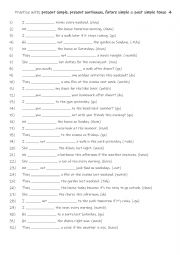
|
A1+-A2 Practise with present simple, present continuous, future simple & past simple tense 4
Students should learn and practice the present simple, present continuous, future simple, and past simple tenses at the A1+-A2 level because these tenses are essential for everyday communication, such as discussing routines, ongoing activities, past events, and simple future plans. They provide a solid foundation for learning more advanced grammar ...
Level: elementary
Age: 7-100
Type:
Downloads: 104
|
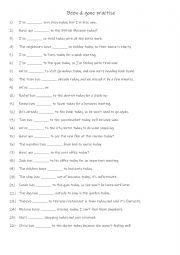
|
A2+-B1 Been & gone practise
Using "been" and "gone" properly helps students master the present perfect tense, which is essential for expressing completed actions that still impact the present.Misusing these words can lead to confusion about whether someone is still at a place or has already returned, so learning the difference is essential for clear communication. Each word i...
Level: intermediate
Age: 9-100
Type:
Downloads: 110
|
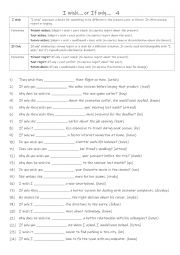
|
B1-B2 I wish�. or If only�. 4
First, students need to familiarise themselves with the 2 patterns and their use. Then they read the sentences to work out which tense is needed to complete the gap-fill using the infinitive in (). Each pattern is used 12 times! Answers on page 2
Level: intermediate
Age: 10-100
Type:
Downloads: 115
|
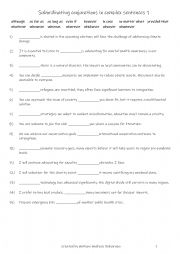
|
B1+-B2 15 subordinating conjunctions in complex sentences part 1
Using subordinating conjunctions allows students to express more detailed and nuanced thoughts. For instance, "although" and "even if" help convey contrast or condition in sophisticated ways. They add variety to writing and speaking, moving beyond simple sentences and making communication more engaging and dynamic. For example, "whenever" or "whoev...
Level: intermediate
Age: 10-100
Type:
Downloads: 112
|
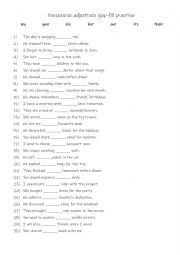
|
Possessive adjectives gap fill practise
Students read the sentence to identify the subject, then use the correctpossessive adjective to complete the gap fill. This worksheet is suitable for A1-A2 students. Answers on page 2.
Level: elementary
Age: 10-100
Type:
Downloads: 117
|
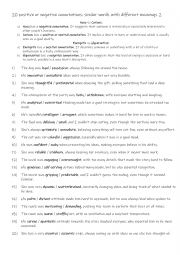
|
20 positive or negative connotations similar words with different meanings 2
First, students need to familiarise themselves with the sentences with 20 connotations and check their meaning of each word. Then they read the sentences to see which one is best to complete the sentence. Answers on page 2.
Level: intermediate
Age: 10-100
Type:
Downloads: 107
|
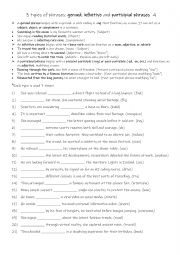
|
B1+-C1 3 types of phrases gerund, infinitive and participial phrases 4
First, students need to familiarise themselves with the 3 types of phrases and their use. Then they read the sentences to work out which one is needed to complete the gap-fill. Each verb pattern is used 7 times! Answers on page 2.
Level: intermediate
Age: 11-100
Type:
Downloads: 124
|
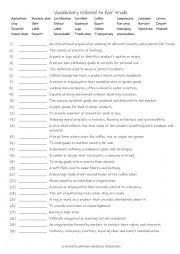
|
B1-B2 Vocabulary related to fair trade
First, students need to familiarise themselves with the 25 words and their meanings Then they read the definitions to see which one is being described and write that word in the space provided. Answers on page 2.
Level: intermediate
Age: 12-100
Type:
Downloads: 118
|
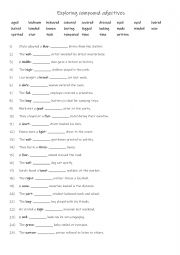
|
B1 Exploring 25 compound adjectives
Compound adjectives provide a more specific description than single adjectives. For example, �high-speed train� is more precise than just �fast train.� This precision helps convey exact meanings and avoids ambiguity.In formal writing, such as academic papers or professional reports, compound adjectives can make descriptions more precise and your ar...
Level: intermediate
Age: 10-100
Type:
Downloads: 103
|
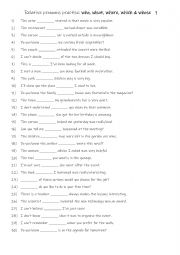
|
A1+-A2 Relative pronouns practise who, what, where, which & whose 1
Practising relative pronouns like who, what, where, which, and whose is essential for students as it helps them connect ideas, create complex sentences, and improve the overall clarity of their communication. By specifying people, places, or things, relative pronouns make sentences more precise and cohesive, enhancing both writing and speaking skil...
Level: elementary
Age: 8-100
Type:
Downloads: 122
|
|
|
|
|












